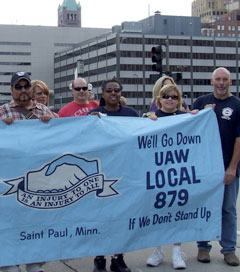President Bob King of the United Auto Workers (UAW) union is proving again that he's one of our most astute labor leaders, a worthy occupant of the position once held by the legendary Walter Reuther.
King's latest column in Solidarity, the UAW's official magazine, certainly proves that. King writes about the severe weakening of the union rights that are supposedly guaranteed all working people – the right to organize. King calls that “the first amendment for workers.”
That basic and essential right was granted US workers by the National Labor Relations Act – the NLRA – which was enacted in 1935 as part of President Franklin D. Roosevelt's New Deal measures, which were designed in part to pull the country out of the Great Depression.
But now, says UAW President King, the NLRA's basic process for determining whether workers want to organize – having them vote for or against unionization – is “fatally flawed.” King says the National Labor Relations Board – the NLRB – which is charged with enforcing the NLRA, does not do that – “does not protect workers' right to organize.”
Workers' lack of adequate legal protection is not a new development, as King notes. It's been a serious problem for several decades. Since the 1970s, employers have been allowed to hire anti-union consultants “to design sophisticated ways to intimidate workers trying to organize.”
Boy, have they. Supervisors are trained to put pressure on individual workers to vote against unionizing. Workers are forced to attend meetings where they are warned of the dire consequences they'll face if they vote for unionizing. Employers threaten to close down if their employees vote for a union. Union supporters are commonly disciplined, sometimes fired. And employers' lawyers “find thousands of excuses for delaying elections.”
King needn't look beyond his own union for examples of the NLRB's ineffectiveness against the dictatorial actions of employers against unions. He could cite hundreds of cases involving the UAW.
For instance, last August, six years after the UAW lost a union election by just three votes at a facility in North Carolina, the NLRB finally ordered a new election “because the employer violated the law in more than a dozen ways.” The violations included threatening to do away with the jobs held by union supporters, spying on workers' meetings and interrogating workers about union activity.
By now, however, all 25 members of the union's organizing committee have left for other jobs, most union supporters have been fired, laid off or quit. And the new election still hasn't been scheduled.
Another example involves a California facility. Seventy percent of the workers there signed union membership cards, but were so intimidated by management that only 19 workers out of 161 dared vote for UAW representation.
King says the union is “returning to its roots of direct action on behalf of workers rights.” Which is no small matter, given the UAW's influential position within the labor movement.
The union is demanding that “all corporations, whether American or foreign-owned, allow their workers to freely decide whether to organize.”
King calls that “the battle of our generation,” as it surely is. He says that “the battle for the First Amendment right to organize will determine the survival of the labor movement. It is the mission of our generation of trade unionists to secure these rights for future generations. We must win this fight for our children and grandchildren.”
King and other UAW officers are going to “call upon each and every member to give some time – perhaps two hours a week – to participate in public demonstrations for the First Amendment.”
The union also will be seeking the support of workers and their unions in other countries, since the UAW is dealing with companies whose owners are in Japan, Korea and Germany and whose products are sold worldwide. The UAW will, in turn, support the struggles of foreign workers for union rights in their countries, as part of “the global fight to force corporations to respect workers' right to organize.”
It's important to remember the UAW's crucial role in helping establish a true middle class in this country through its organizing of the auto industry. That led workers in other industries to also demand – and get – decent wages, benefits and working conditions.
UAW President King thinks his union can lead the way again, this time to reforms that will protect and expand the union rights that the autoworkers and others won seven decades ago. Those are the rights that had so much to do with the rise of a true middle class, whose standing is now endangered by the anti-union onslaughts of employers and their government allies.
Join us in defending the truth before it’s too late
The future of journalism is uncertain, and the consequences of losing it are too grave to ignore. To ensure Truthout remains fearless, tough, and 100 percent independent, we rely on reader support. Every dollar you donate goes directly toward the costs of producing news you can trust.
Please give what you can — because by supporting us with a tax-deductible donation, you’re not just preserving a source of news, you’re helping to safeguard what’s left of our democracy.
